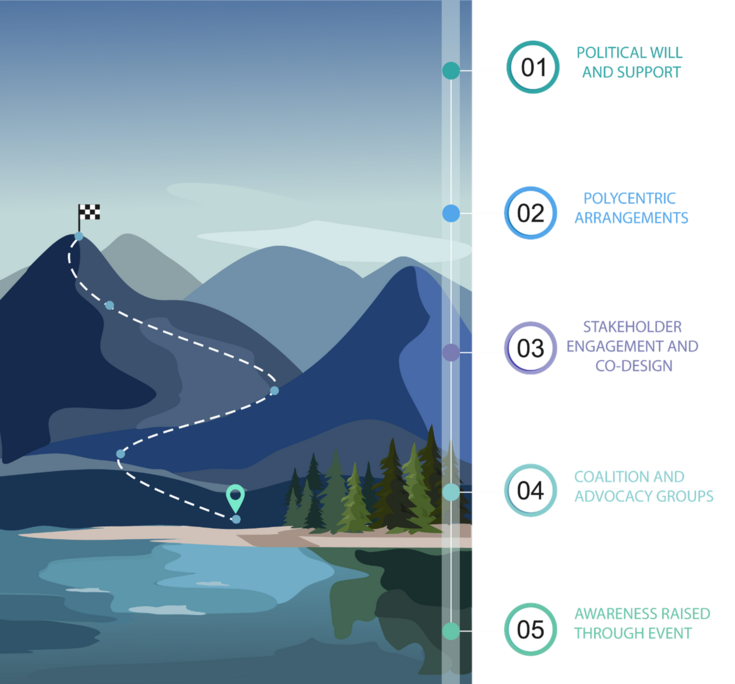The governance of nature-based solutions for biodiversity conservation
SUPERVISOR: Thomas THALER
PROJECT ASSIGNED TO: Juliette MARTIN
Biodiversity - the diversity of all life on earth - is declining at unprecedented rates (European Environment Agency, 2020; WWF, 2022). Simultaneously, the window of opportunity for remaining below a global temperature rise of 1.5°C is rapidly closing (Bossy et al., 2024), with significant repercussions on biodiversity (Trew & Maclean, 2021; Habibullah et al., 2022). While the biodiversity and climate change crises are intrinsically connected, they are still largely addressed separately in policy (Pettorelli et al., 2021).
Nature-based solutions (NbS) have emerged as a critical umbrella concept encompassing all measures using nature’s properties to protect, conserve, restore, sustainably use and manage ecosystems to address societal challenges (United Nations Environment Assembly, 2022). Due to their multiple co-benefits (i.e., benefits that occur as additional byproducts to the primary NbS goal (Raymond et al., 2017)), NbS have been proposed as promising pathways to successfully integrate the biodiversity and climate changes agendas (Seddon et al., 2021; Chausson et al., 2020; Girardin et al., 2021) and help tackle disaster risk reduction (Faivre et al., 2018; McVittie et al., 2018; Thaler et al., 2023; Ruangpan et al., 2020). However, the success of NbS in meeting their promise of addressing global societal challenges depends on the governance regimes that can enable their implementation (Albert et al., 2019; Davis et al., 2018; Martin et al., 2021). NbS governance goes beyond legal, institutional and policy arrangements (Lemos & Agrawal, 2006; Steurer, 2013) to include a network of state and non-state actors (such as businesses, civil society, NGOs and expert communities) in the process of deciding on, financing and implementing NbS.
NBS have gained increasing recognition in global policy narratives, such as the recent Global Biodiversity Framework (Convention on Biological Diversity, 2022), Nationally Determined Contributions (Seddon et al., 2019) and the United Nations Environment Assembly resolution 5/5 (United Nations Environment Assembly, 2022). NBS are also embedded in a variety of policy frameworks in Europe, such as the EU Biodiversity Strategy for 2030 (European Commission, 2020), the EU Forest Strategy (European Commission, 2021b) and the EU Strategy on Adaptation to Climate Change (European Commission, 2021a).
While policy ambitions for NbS are high, they do not yet match on-the-ground implementation (Davis et al., 2018; Seddon et al., 2020; Chausson et al., 2020). Indeed, nature-negative investments are still 140 times larger than nature-positive investments, which would need to be tripled by 2030 to reach global climate and biodiversity targets (United Nations Environment Programme, 2023).
To understand the reasons behind this implementation gap, it is imperative to understand the governance drivers, frameworks, strategies and instruments that have enabled or hindered NbS across different contexts. Effective governance stands at the heart of successful environmental policy interventions, and has been repeatedly shown to explain variations in conservation achievements across the globe (Baynham-Herd et al., 2018; Amano et al., 2018; Smith et al., 2003; Melick, Kinch & Govan, 2012).
With a particular focus on implications for biodiversity conservation and using mixed qualitative and quantitative research methodologies, the proposed PhD aims to explore 1) the critical governance factors and policy options that can enable a wider NbS adoption 2) the governance barriers that are impeding NbS mainstreaming.
The proposed PhD will build on work carried out as part of the EU-funded project the Hut (Grant agreement 101073957), the EU-funded project PHUSICOS (Grant agreement 776681), as well as the International Institute for Applied Systems Analysis’ Strategic Initiatives Program. Work will be based on applied NbS case studies from these projects, including the Upper Bhima Basin (India), canton Bern (Switzerland), the Pyrenees (France/Spain), the Serchio river Basin (Italy) and Gudbrandsdalen (Norway).
Figures:

Figure 1: Bernese Alps with forested slopes

Figure 2: Key governance enablers for NbS success identified from 3 case studies
References
Albert, C., Schröter, B., Haase, D., Brillinger, M., et al. (2019) Addressing societal challenges through nature-based solutions: how can landscape planning and governance research contribute? Landscape and Urban Planning. 182, 12–21.
Amano, T., Székely, T., Sandel, B., Nagy, S., et al. (2018) Successful conservation of global waterbird populations depends on effective governance. Nature. 553 (7687), 199–202.
Baynham-Herd, Z., Amano, T., Sutherland, W.J. & Donald, P.F. (2018) Governance explains variation in national responses to the biodiversity crisis. Environmental Conservation. 45 (4), 407–418.
Bossy, T., Gasser, T., Tanaka, K. & Ciais, P. (2024) On the chances of staying below the 1.5°C warming target. Cell Reports Sustainability. [Online] 1 (7), 100127. Available from: doi:https://doi.org/10.1016/j.crsus.2024.100127.
Chausson, A., Turner, B., Seddon, D., Chabaneix, N., et al. (2020) Mapping the effectiveness of nature-based solutions for climate change adaptation. Global Change Biology. [Online] 26 (11), 6134–6155. Available from: doi:10.1111/GCB.15310.
Convention on Biological Diversity (2022) Kunming-Montreal Global biodiversity framework, Draft decision submitted by the President. [Online]. Available from: www.cbd.int/doc/c/e6d3/cd1d/daf663719a03902a9b116c34/cop-15-l-25-en.pdf.
Davis, M., Abhold, K., Mederake, L. & Knoblauch, D. (2018) Nature-based solutions in European and national policy frameworks. Deliverable of the NATURVATION Project.
European Commission (2020) EU Biodiversity Strategy for 2030 - Bringing nature back into our lives. [Online]. p.COM/2020/380 final. Available from: eur-lex.europa.eu/legal-content/EN/TXT/.
European Commission (2021a) Forging a climate-resilient Europe - the new EU Strategy on Adaptation to Climate Change. [Online]. p.COM/2021/82 final. Available from: eur-lex.europa.eu/legal-content/EN/TXT/.
European Commission (2021b) New EU Forest Strategy for 2030. [Online]. p.COM/2021/572 final. Available from: eur-lex.europa.eu/legal-content/EN/TXT/.
European Environment Agency (2020) State of nature in the EU: results from reporting under the nature directives 2013-2018. EEA Report No 10/2020.
Faivre, N., Sgobbi, A., Happaerts, S., Raynal, J., et al. (2018) Translating the Sendai Framework into action: The EU approach to ecosystem-based disaster risk reduction. International Journal of Disaster Risk Reduction. [Online] 32, 4–10. Available from: doi:10.1016/J.IJDRR.2017.12.015.
Girardin, C.A.J., Jenkins, S., Seddon, N., Allen, M., et al. (2021) Nature-based solutions can help cool the planet—if we act now.
Habibullah, M.S., Din, B.H., Tan, S.-H. & Zahid, H. (2022) Impact of climate change on biodiversity loss: global evidence. Environmental Science and Pollution Research. 29 (1), 1073–1086.
Lemos, M.C. & Agrawal, A. (2006) Environmental governance. Annual Review of Environment and Resources. 31 (1), 297–325.
Martin, J.G.C., Scolobig, A., Linnerooth-Bayer, J., Liu, W., et al. (2021) Catalyzing Innovation: Governance Enablers of Nature-Based Solutions. Sustainability. 13 (4), 1971.
McVittie, A., Cole, L., Wreford, A., Sgobbi, A., et al. (2018) Ecosystem-based solutions for disaster risk reduction: Lessons from European applications of ecosystem-based adaptation measures. International Journal of Disaster Risk Reduction. [Online] 32 (September 2017), 42–54. Available from: doi:10.1016/j.ijdrr.2017.12.014.
Melick, D.R., Kinch, J.P. & Govan, H. (2012) How global biodiversity targets risk becoming counterproductive: the case of Papua New Guinea. Conservation and Society. 10 (4), 344–353.
Pettorelli, N., Graham, N.A.J., Seddon, N., Maria da Cunha Bustamante, M., et al. (2021) Time to integrate global climate change and biodiversity science‐policy agendas. Journal of Applied Ecology. 58 (11), 2384–2393.
Raymond, C.M., Frantzeskaki, N., Kabisch, N., Berry, P., et al. (2017) A framework for assessing and implementing the co-benefits of nature-based solutions in urban areas. Environmental Science & Policy. [Online] 77, 15–24. Available from: doi:10.1016/J.ENVSCI.2017.07.008.
Ruangpan, L., Vojinovic, Z., Di Sabatino, S., Leo, L.S., et al. (2020) Nature-based solutions for hydro-meteorological risk reduction: a state-of-the-art review of the research area. Natural Hazards and Earth System Sciences. [Online] 20 (1), 243–270. Available from: doi:10.5194/NHESS-20-243-2020.
Seddon, N., Chausson, A., Berry, P., Girardin, C.A.J., et al. (2020) Understanding the value and limits of nature-based solutions to climate change and other global challenges. Philosophical Transactions of the Royal Society B. 375 (1794), 20190120.
Seddon, N., Smith, A., Smith, P., Key, I., et al. (2021) Getting the message right on nature‐based solutions to climate change. Global change biology. 27 (8), 1518–1546.
Seddon, N., Turner, B., Berry, P., Chausson, A., et al. (2019) Grounding nature-based climate solutions in sound biodiversity science. Nature Climate Change. [Online] 9 (2), 84–87. Available from: doi:10.1038/S41558-019-0405-0.
Smith, R.J., Muir, R.D.J., Walpole, M.J., Balmford, A., et al. (2003) Governance and the loss of biodiversity. Nature. 426 (6962), 67–70.
Steurer, R. (2013) Disentangling governance: a synoptic view of regulation by government, business and civil society. Policy Sciences. 46 (4), 387–410.
Thaler, T., Hudson, P., Viavattene, C. & Green, C. (2023) Natural flood management: Opportunities to implement nature‐based solutions on privately owned land. Wiley Interdisciplinary Reviews: Water. 10 (3), e1637.
Trew, B.T. & Maclean, I.M.D. (2021) Vulnerability of global biodiversity hotspots to climate change. Global Ecology and Biogeography. 30 (4), 768–783.
United Nations Environment Assembly (2022) Resolution UNEP/EA.5/Res.5 adopted by the United Nations Environment Assembly on 2 March 2022. [Online]. Available from: wedocs.unep.org/bitstream/handle/20.500.11822/39864/NATURE-BASED SOLUTIONS FOR SUPPORTING SUSTAINABLE DEVELOPMENT. English.pdf?sequence=1&isAllowed=y.
United Nations Environment Programme (2023) State of Finance for Nature: The Big Nature Turnaround - Repurposing $7 trillion to combat nature loss. [Online]. Available from: doi:https://doi.org/10.59117/20.500.11822/44278.
WWF (2022) Living Planet Report 2022 - building a nature-positive society. R.E.A. Almond, M. Grooten, & T. Peterson (eds.). Gland, Switzerland, World Wildlife Fund.
